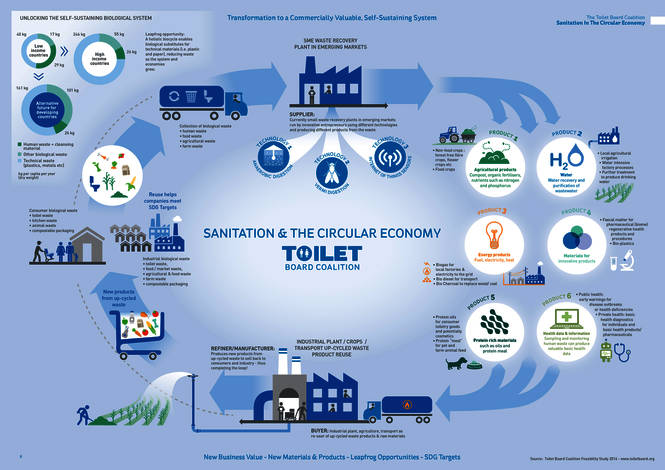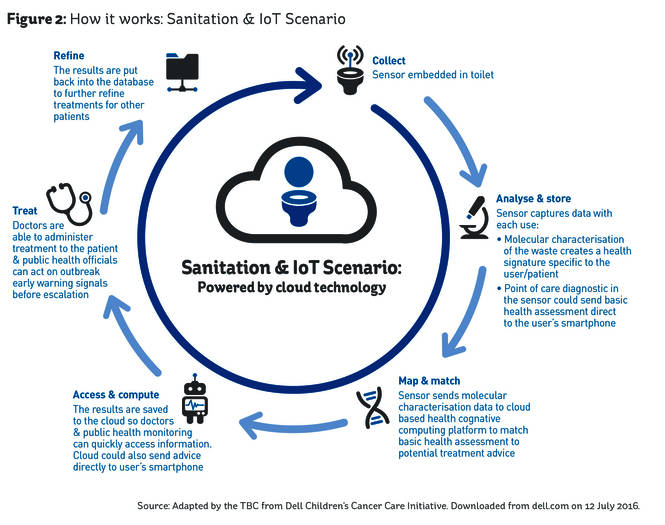Future Now
The IFTF Blog
Dispatch from the Future of Sanitation - 1st Global Toilet Business Innovation Summit
On November 15-17 The Toilet Board Coalition hosted the 1st Global Toilet Business, Innovation, and Investment Summit in Mumbai, India. The summit brought together key players across the sanitation sector – multinationals Unilever, Kimberly Clark Corporation, LIXIL and Firmenich, aid and development agencies such as The World Bank and UNICEF, and over 75 entrepreneurial young businesses – to flush out the untapped business opportunities in toilets. There are currently over 2.4 billion people in need of improved sanitation, and the Toilet Board believes that is a big business opportunity for the next decade.
I participated in the summit on behalf of Institute for the Future to share Artifacts from the Future and help the companies and startups in attendance think beyond the urgency of the present to imagine radically different futures for sanitation. Drawing from our research on the future of health, technology, food, work, cities, and peace and development, I looked for places where these futures intersect with sanitation. As one summit participant remarked, “sanitation is everyone’s business.” It’s a truly intersectional future topic that touches on human and environmental health, empowerment of women, children’s access to education, sustainable farming and energy practices, rapid urbanization, and more. Here are a few of my big takeaways, as well as some of the exciting early signals of the future that I observed at the summit.
IFTF Distinguished Fellow, Bob Johansen, often reminds us that the right language matters to draw people toward your future. From the start, the Toilet Board asked us to stop using the phrase “human waste” and instead call it “toilet resources” in order to acknowledge poop as a valuable fertilizer, protein, and energy source. Changing your language can change what kind of future you get and bring more people on board with your vision. This mindset shift toward valuing toilet resources is closely linked with the idea of the circular economy.
Circular Economy
The Toilet Board released a report, Sanitation in the Circular Economy, which is about taking the outputs of one industry as the inputs for another. They ask “could we drive more demand for toilets if people valued the materials they produce?” The report explores if we could leapfrog the linear sewage systems that most developed countries have, and be more efficient with our inputs and outputs in a circular system. In IFTF’s 2016 health and food research, we explored the growing imperative for more regenerative businesses. There are efforts underway across all sectors to make your handprint bigger than your footprint. In the biological circular economy there is an opportunity to transform sanitation from an undesirable cost into a commercially viable and self-sustaining system. It’s already happening on a small scale in low-income markets, and has the potential to scale if companies join the cause.
There’s an easy business case
Thirty companies recently signed the World Business Council for Sustainable Development (WBCSD) WASH Pledge - a business-led initiative that secures access to safe water, sanitation and hygiene (WASH) for all employees at the workplace. According to the World Health Organization (WHO), for every US$1 invested in water and sanitation, US$4.3 is generated from improved productivity, reduced sick days and a more able bodied workforce. Sanitation doesn’t have to be an expense or a CSR move, but is actually a good business opportunity. Over the next decade, there are opportunities for companies to align this commitment with their other innovation efforts and have the private sector drive building sanitation infrastructure.
This is largely about behavior change
We know that just having a new technology (or access to a toilet) isn’t enough if people don’t actually use it. For example, the Indian government backed Swachh Bharrat Mission aims to end all open defecation in India by 2019. But, just building toilets won’t be enough to achieve that. Many of the startups at the summit were working on education and behavior change models in addition to building the toilet systems.
Gameful engagement incentives new sanitation practices
Led by our director of game research and development, Jane McGonigal, IFTF has pioneered research on the important role of games to change behavior. Samagra, one of the companies in the 2017 Toilet Accelerator, was inspired by this understanding of how games can encourage behavior change and created a loyalty program incentivize people to participate in the pay-per-use public toilet model.
The Reciprocity Advantage is important
Bob Johansen and Karl Ronn’s book, The Reciprocity Advantage: A New Way to Partner for Innovation and Growth, shares a new model for how companies can partner to create new growth: define your right-of-way (the underutilized resources you already own that you can share with others), partner to do what you can’t do alone, experiment to learn, and scale the new business at low risk. It emphasizes the importance of reciprocity as a business strategy – and I saw evidence of that at play in the collaboration between different toilet companies at the summit.
There were a handful of companies at the Summit all working on systems that collect toilet resources and process them to create fertilizer, fuel, or protein sources. (See: Sanivation, Loowatt, Sanergy, Soil, or SaifSana). At the summit they came together to share best practices and help each other all increase the speed of innovation. In an environment where groups are competing for philanthropic or grant funds, a scarcity mindset doesn’t encourage collaboration. However, each of these companies is working in different parts of the world (Kenya, Madagascar, Haiti, India). Just one group cannot address the size of the sanitation challenge. They agreed that helping each other now would help everyone out in the long run and show both the aid agencies and companies that they are a unified group who believe in the importance of this approach.
There’s a technology innovation angle, too
The other Toilet Board report released at the summit is Digitization of Sanitation. It looks beyond the today’s urgency of just building more toilets, to all the opportunities for more digital technology, embedded sensing and diagnostics that could make the toilet a health data capturing device, and coordination and logistics platforms to drive the industry forward. Some ideas that I heard participants discussing on this topic ranged from getting circular-economy sanitation built into the foundation of smart cities, public toilets that have to advertise to attract users based on payment for the health data they can gather, or even a system of Blockchain enabled toilets to securely track that personal data.
Signals of the future of toilets and sanitation
A signal is a small or local innovation with the potential to scale in size, impact, and geographic distribution. Signals can be combined into clusters that start to tell a bigger story about the future. Here are a few of the signals I learned about at the Summit:
- Eliminating the “yuck factor” with smell science: Gates Foundation and Firmenich are tackling malodor with “smell-cancelling” technology. Millions of new toilets are being built around the world to help end open defecation. Unfortunately, many of these new toilets, especially the pit latrines, don’t get used because they smell bad and people continue to relieve themselves in the open where the air is fresher. Firmenich researchers developed fragrances that block certain receptors in our noses, making us unable to register certain malodors.
- Make sanitation more fun: The World Toilet Organization is releasing a movie called Flush Revolution. Their founder, Jack Sim (aka Mr. Toilet), has an amazing way of making toilets really fun. Watch the trailer and you’ll see what I mean. Making toilets glamorous is a big task, but if done successfully could get a lot more people excited about a very important issue.
- Google Maps Toilet Locater – 70% of India’s households don’t have a toilet. India’s Ministry of Urban Development (MoUD) is partnering with Google to launch a toilet-locator tool on Google Maps to help people find access clean public restrooms.
- Low-cost sensors enable demand-drive waste collection: Sanergy has 800 toilet facilities that serve 40,000 people in Kenya. They are a container-based system that collects the toilet resources and turns them into agricultural fertilizer and animal feed (with black larvae flies). There is a big logistical cost to collecting and maintaining all of those toilets – so they are starting to install sensors on the containers that alert them when one is almost full, enabling a smarter management of the system.
- On-demand economy comes to waste collection: Waste Ventures India is an on-demand economy platform for solid waste collection (recycling). They’re experimenting with a platform to more efficiently coordinate the work that now happens very informally in this economy, and partnering with companies like Tetra Pak to get better refund rates for their waste pickers. IFTF’s Workable Futures initiative is looking beyond today’s workforce disruptions toward positive platforms for the next generation of work. Join us next week for the Positive Platforms Jam to help design on-demand work platforms that are more sustainable and equitable for everyone.
- 2017 Toilet Accelerator Businesses: the TBC’s flagship business mentoring scheme announced its new cohort of companies: Biocycle, SafiSana, Samagra, Sanergy and Sanivation. All five businesses are all at the fore of sanitation innovation, from Samagra working at intersection of design, technology and behavioural science to tackle the issue of open defecation in India, to SafiSana, Sanergy, Biocycle and Sanivation’s circular approaches to collecting the by-products of sanitation from toilets into affordable and sustainable resources such as fuel, fertilisers and proteins. Over the next year, the five businesses will receive mentoring, business intelligence and in-kind business support from the Toilet Board Coalition and its corporate members. For more information, visit www.toiletboard.org.





